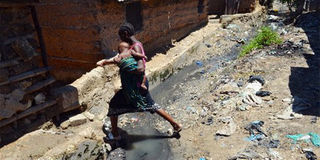Sewer lines hamper fight against cholera

A woman at Mburukenge slums in Mombasa jumps over a broken sewer line where suspected outbreak of cholera has claimed three lives in this photo taken on April 23, 2015. At least 30 people have been admitted to a hospital in Nairobi after they contracted cholera. PHOTO | KEVIN ODIT |
What you need to know:
- The county Health executive Binti Omar said the Public Health Department would issue closure notices to eateries that pose a great danger owing to poor hygiene.
- Mr Michael Mwita, who lost a child, said he is confused. His wife and two other children are admitted to a hospital in Mwembe Tayari suffering from cholera-like symptoms.
- Some kiosks have been demolished in the Mombasa’s Central Business District, while others have been shut down. County officials have also sent a red alert to Miritini and Likoni.
Poor sewerage system in slums is hampering the control of a cholera outbreak, Mombasa Chief Officer Khadija Shikely said.
She also said the heavy rains in the county were making it difficult to contain the highly infectious disease.
“We have been disinfecting water with chlorine. But the heavy rains and poor sewerage system are thwarting our efforts,” Dr Shikely said.
She said between early and mid-April, three people died of cholera in Likoni.
“The area has been free of the disease until on Wednesday when another person died at Mburukenge slum. The slum is built on a sewer line. It is a time bomb wasting to explode,” the doctor said.
GREAT DANGER
The county Health executive Binti Omar said the Public Health Department would issue closure notices to eateries that pose a great danger owing to poor hygiene.
She said due to congestion and poor sanitary conditions in slums, it is difficult to control cholera.
“We are distributing aqua tabs to all households. However, in places like Mburukenge, Moroto or Owino Uhuru, it is a challenge to control the cholera outbreak. We would concentrate on the slums to curb the disease,” she said.
“We believe cholera is being transmitted through open sewers carrying waste from hospitals. We have another confirmed case at Miritini,” she said.
Ms Omar said a surveillance team has been sent to slums.
Meanwhile, thousands of slum dwellers at Mburukenge, Miritini and Dunga Unuse have appealed to county government to curb the spread of the disease.
An elder at Mburukenge Kadzo Karisa said: “The affected people all had diarrhoea were vomiting. We are in great danger because all the sewer lines pour into this area.
Mr Michael Mwita, who lost a child, said he is confused. His wife and two other children are admitted to a hospital in Mwembe Tayari suffering from cholera-like symptoms.
“Our neighbour died mysteriously after a bout of diarrhoea. Days later, my child became sick and we were told at a clinic that he had cholera. He was given medicine but the diarrhoea did not stop. I called a pastor to pray for us, but the child died,” Mr Mwita said.
“Our environment is bad for people to live in, but we have no choice. I am waiting for my family to return home,” he said.
Ms Binti confirmed the deaths of three people, but, however, said only one cholera case has been confirmed.
She said: “We have taken the samples for test,” she added.
As the county government grapples with the disease, Dr Shikely said an aggressive awareness campaign in underway.
RED ALERT
“We are calling in teams from the sub-counties to strengthen the campaign in the slums.” she said.
Some kiosks have been demolished in the Mombasa’s Central Business District, while others have been shut down. County officials have also sent a red alert to Miritini and Likoni.
Two weeks ago, the weatherman predicted inadequate rainfall in parts of the country in the coming weeks and an outbreak of cholera.
Speaking to the Nation by phone on Friday, the Meteorological Department’s Senior Assistant Director, Mr Samuel Mwangi, said heavy rains would intensify in the second half of April to June.





